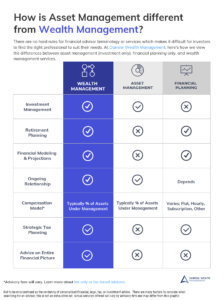When starting to search for a financial advisor, investors may not realize the different types of advisors out there…and they’re not all trying to sell you something. If you’re looking for a fee-only financial advisor or wealth manager, it’s probably because you know fee-only advisors don’t sell products.
Finding the right financial advisor is so important. Here are some ways to find the best fee-only financial advisor to suit your needs. Here’s an explainer on the differences between fee-only and fee-based advisors.
What do fee-only financial advisors cost?
The term fee-only can be confusing to investors. It’s a common misconception that all firms charge on an hourly or flat fee basis. Although some firms use these compensation methods, the majority base fees on a percentage of assets under management (AUM) for their services.
Fee-only firms are unique as they do not receive commissions from selling financial products, such as insurance policies or investment products. This compensation structure is designed to reduce conflicts and align interests.
Fee-only financial advisors are often registered investment advisors too, meaning they have a legal duty to act in the client’s best interest. This fiduciary duty is a cornerstone of their practice, providing clients with the confidence that their financial advisor is working solely for them.
Top considerations when searching for a fee-only advisor
- Fiduciary responsibility. Only fiduciary financial advisors are legally bound to act in your best interest at all times. A registered investment advisor is the only type of financial advisory firm required to act as a full-time fiduciary. While many fee-only advisors are also fiduciaries, it’s not a requirement.
- Independent firm. Many advisory and investment management firms are subsidiaries of a larger parent corporation or have affiliations with other companies that offer complimentary services, like life insurance or investment products. Working with an independent firm can reduce the risk of receiving biased advice.
- Do you have a unique situation? The ability to advise on standard financial planning matters such as retirement planning should be table stakes (if not, red flag). But even comprehensive wealth advisors have blind spots or can only go an inch deep on certain subjects. Always seek a specialist if you have a unique situation. For example, Darrow Wealth Management specializes in working with clients who have equity compensation like stock options or are experiencing a sudden wealth or liquidity event from selling their business or receiving an inheritance.
- Do you really need a fee-only financial advisor near you? For many investors, the most important factor when trying to find fee-only planners is location. In-person meetings may be ideal, but technology meeting face-to-face easy, regardless of your location. Consider prioritizing your financial needs and the right overall fit versus just Googling best financial advisor near me. After all, if you move, or if your advisor does, you probably won’t want to start over with a new firm.
3 ways to find a fee-only financial advisor
Here are three ways to find a fee-only wealth management firm (in no particular order).
1. Finding a fee-only wealth advisor with a targeted web search
A Google search for fee-only financial advisor near me returns about 500 million results. So, that’s a lot. Consider adding specific attributes that are important to you to help narrow the list.
For example, do you prefer a female financial advisor? Or maybe you need someone who specializes in working with exiting business owners, widows, or partners at a law firm. There are even advisors that focus on planning for employees of specific companies.
With a narrow search, Google can be a great starting point to help you find a fee-only financial planner.
2. The National Association of Personal Financial Advisors
The National Association of Personal Financial Advisors (NAPFA) may come up in some of your searches for an advisor. NAPFA members are all fee-only. However, if you’re trying to find a fiduciary investment advisor, you’ll need to do some extra homework to see if the firm is also a registered investment advisor.
NAPFA can be a useful resource for some individuals, particularly investors just starting out or those with more limited financial planning needs (versus comprehensive advice and ongoing investment management).
However, for several reasons, many fee-only investment advisors choose not to become members of NAPFA. This is another reason to use multiple avenues when looking to find a financial advisor.
3. Ask for referrals
Asking friends, family, coworkers, an accountant, or personal lawyer for a referral can be one of the most effective ways to find a fee-only financial advisor. But, of course, it isn’t fool-proof. Many investors aren’t aware of the differences between fee-only and fee-based advisors – even if they’re working with one.
Personal referrals are especially helpful to get a sense of fees and services. Asking around can be a helpful starting point but consider doing your own research on the planner and firm before engaging.
Checklist: evaluating a financial planner
When evaluating a financial planner and advisory firm, there’s a lot to consider. Here are a few factors to consider in your search.
- Firm structure: Aside from fee-only, consider prioritizing firms that are also registered investment advisors as they must follow a fiduciary standard. Independence is important too, as it can also help ensure investment advice is in your best interest.
- Titles: Financial planners go by many names. Titles alone shouldn’t be relied on when evaluating competence, fit, or alignment with your needs. Planners often go by some combination of terms like [financial, retirement, investment, money, wealth] followed by words like advisor, planner, consultant, manager, specialist. Don’t get too hung up here.
- Professional designations: Look for certifications, but don’t inflate the value of a long string of letters after someone’s name. There are so many credentials in the financial services industry, each with their own standards, qualifications, and merits. The CERTIFIED FINANCIAL PLANNER™ professional (also CFP® professional) designation is often considered the gold standard for financial planners. You can also search for a planner on the CFP board website. On the investment side, it’s the CFA®.
- Financial planning services offered: If you’re only looking for a one-time financial review, the majority of fee-only advisors won’t be a good fit. It’s a common misconception that all fee-only advisors work on an hourly or project basis. Most (including Darrow Wealth Management), are paid as a percentage of the assets they manage for their clients and offer comprehensive advice through ongoing wealth management services.
- Personality: Finding the right advisor means you need someone who has a personality that aligns with yours and with whom you feel comfortable discussing your financial situation and other sensitive matters.
Final word on finding the right advisory partner
At the end of the day, if you or your spouse doesn’t feel confident with or heard by an advisor, it’s probably not a good fit. If you don’t see yourself picking up the phone or reaching out with a question or life update, you’re not going to get what you need out of the relationship.
It’s also important not to compromise on the aspects of the relationship that are important to you. We all have a friend or family member who’s ‘got a guy’ at Morgan Stanley. But if you really want to work with a fiduciary fee-only financial advisor, it might not be a good match, despite the recommendation. Liking and trusting an advisor is paramount, but so too is having the official status to back it up.
Darrow Wealth Management is proud to be:
- Fee-only
- Full-time fiduciary advisors
- CERTIFIED FINANCIAL PLANNER™ professionals
- Independent
- Registered investment advisor
Learn more about our wealth management services or book a phone consultation with a CFP® professional today.








